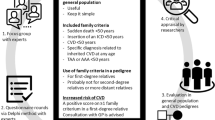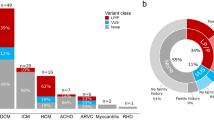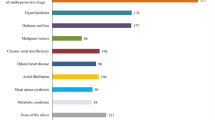Abstract
Current clinical practice regarding inherited cardiac conditions has a biomedical focus, while psychological and social expertize and capacity are often lacking. As patient-centered care entails a multidisciplinary approach, the present study (a) explores barriers and facilitators of implementing patient-centered care in cardiogenetics and (b) contrasts various stakeholder viewpoints and perceived influence. We performed a three-round modified Delphi study using the input of a virtual expert panel comprising 25 medical professionals, 9 psychosocial professionals working in cardiogenetics, and 6 patient representatives. In round 1, the brainstorming phase and workshop breakout sessions were transcribed verbatim, coded and processed into unique statements listed as barriers and facilitators. In round 2, we asked the expert panel to validate, add or revise the list of barriers and facilitators. In round 3, the most relevant barriers and facilitators were ranked in importance. The experts identified 6 barriers dispersed across various levels of implementation. Having a blind spot for the patient perspective was of the highest importance, while the lack of multidisciplinary communication was ranked the lowest. We selected 9 facilitators: 2 were workflow related, 5 advocated various aspects of increased multidisciplinarity, and 2 suggested improvements in patient communication. This study revealed health system and organizational barriers and facilitators predominantly in implementing patient-centered care and only some patient-level factors. Some barriers and facilitators may be addressed easily (e.g., improving communication), while others may prove more complicated (e.g., biomedical thinking). Close interdisciplinary collaboration seems to be needed to implement PCC in cardiogenetics successfully.
This is a preview of subscription content, access via your institution
Access options
Subscribe to this journal
Receive 12 print issues and online access
$259.00 per year
only $21.58 per issue
Buy this article
- Purchase on SpringerLink
- Instant access to the full article PDF.
USD 39.95
Prices may be subject to local taxes which are calculated during checkout




Similar content being viewed by others
Data availability
The data underlying this paper are available in the paper and in its online supplementary material.
References
Tesson S, Butow PN, Sholler GF, Sharpe L, Kovacs AH, Kasparian NA. Psychological interventions for people affected by childhood-onset heart disease: a systematic review. Heal Psychol. 2019;38:151–61.
Platt J. A Person-Centered Approach to Cardiovascular Genetic Testing. Cold Spring Harb Perspect Med. 2020;10:1–14.
Resta R, Biesecker BB, Bennett RL, Blum S, Estabrooks Hahn S, Strecker MN, et al. A New Definition of Genetic Counseling: National Society of Genetic Counselors’ Task Force Report. J Genet Couns [Internet]. 2006;15:77–83. https://doi.org/10.1007/s10897-005-9014-3.
Ingles J, Yeates L, Semsarian C. The emerging role of the cardiac genetic counselor. Hear Rhythm. 2011;8:1958–62.
Cirino AL, Harris S, Lakdawala NK, Michels M, Olivotto I, Day SM, et al. Role of genetic testing in inherited cardiovascular disease: a review. JAMA Cardiol. 2017;2:1153–60.
Paljevic ED. Complexities of Cardiac Genetic Testing. J Nurse Pr [Internet]. 2019;15:139–.e1. https://doi.org/10.1016/j.nurpra.2018.09.009.
Middleton A, Hall G, Patch C. Genetic counselors and Genomic Counseling in the United Kingdom. Mol Genet Genom Med. 2015;3:79–83.
Doyle DL, Awwad RI, Austin JC, Baty BJ, Bergner AL, Brewster SJ, et al. 2013 Review and Update of the Genetic Counseling Practice Based Competencies by a Task Force of the Accreditation Council for Genetic Counseling. J Genet Couns. 2016;25:868–79.
Aatre RD, Day SM. Psychological Issues in Genetic Testing for Inherited Cardiovascular Diseases. Circ Genet. 2011;4:81–90.
Cirino AL, Ho CY. Genetic testing for inherited heart disease. Circulation 2013;128:1–10.
Musunuru K, Hershberger RE, Day SM, Klinedinst NJ, Landstrom AP, Parikh VN, et al. Genetic Testing for Inherited Cardiovascular Diseases: A Scientific Statement From the American Heart Association. Circ Genom Precis Med. 2020;13:e000067.
Ahmad N, Ellins J, Krelle H, Lawrie M, Health Foundation (Great Britain). Person-centred care: from ideas to action [Internet]. London: Health Foundation. 2014. p. 1–100. www.health.org.uk
Desomer A, Van den Heede K, Triemstra M, Paget J, De Boer D, Kohn LCI. Use of patient-reported outcome and experience measures in patient care and policy. Health Services Research (HSR) Brussels: Belgian Health Care Knowledge Centre (KCE). KCE Reports. 2018.
Tramonti F, Giorgi F, Fanali A. Systems thinking and the biopsychosocial approach: A multilevel framework for patient-centred care. Syst Res Behav Sci. 2021;38:215–30.
Caleshu C, Kasparian NA, Edwards KS, Yeates L, Semsarian C, Perez M, et al. Interdisciplinary psychosocial care for families with inherited cardiovascular diseases. Trends Cardiovasc Med. Elsevier Inc.; 2016;26:647–53.
Metcalfe SA. Genetic counselling, patient education, and informed decision-making in the genomic era. Semin Fetal Neonatal Med [Internet]. 2018;23:142–9. https://doi.org/10.1016/j.siny.2017.11.010.
Ingles J, Johnson R, Sarina T, Yeates L, Burns C, Gray B, et al. Social determinants of health in the setting of hypertrophic cardiomyopathy. Int J Cardiol. 2015;184:743–9.
Sandhu U, Kovacs AH, Nazer B. Psychosocial symptoms of ventricular arrhythmias: Integrating patient-reported outcomes into clinical care. Heart Rhythm. 2021;2:832–9. O2
van den Heuvel LM, Sarina T, Sweeting J, Yeates L, Bates K, Spinks C, et al. A prospective longitudinal study of health-related quality of life and psychological wellbeing after an implantable cardioverter-defibrillator in patients with genetic heart diseases. Hear Rhythm. 2022;3:143–51. O2
Hanssen DJC, Ras A, Rosmalen JGM. Barriers and facilitators to the implementation of interventions for medically unexplained symptoms in primary care: a modified Delphi study. J Psychosom Res [Internet]. 2021;143:110386 https://doi.org/10.1016/j.jpsychores.2021.110386.
Keeney S, Hasson F, McKenna H. Consulting the oracle: Ten lessons from using the Delphi technique in nursing research. J Adv Nurs. 2006;53:205–12.
Schmidt RC. Managing Delphi surveys using nonparametric statistical techniques. Decis Sci. 1997;28:763–74.
Okoli C, Pawlowski SD. The Delphi method as a research tool: An example, design considerations and applications. Inf Manag. 2004;42:15–29.
Eijzenga W, Bleiker EMA, Hahn DEE, Kluijt I, Sidharta GN, Gundy C, et al. Psychosocial Aspects of Hereditary Cancer (PAHC) questionnaire: development and testing of a screening questionnaire for use in clinical cancer genetics. Psychooncology. 2014;23:862–9.
Kennedy HP. Enhancing Delphi research: Methods and results. J Adv Nurs. 2004;45:504–11.
Scholl I, LaRussa A, Hahlweg P, Kobrin S, Elwyn G. Organizational- and system-level characteristics that influence implementation of shared decision-making and strategies to address them - a scoping review. Implement Sci. 2018;13:1–22.
Moore L, Britten N, Lydahl D, Naldemirci Ö, Elam M, Wolf A. Barriers and facilitators to the implementation of person-centred care in different healthcare contexts. Scand J Caring Sci. 2017;31:662–73.
Luxford K, Gelb Safran D, Delbanco T. Promoting patient-centered care: a qualitative study of facilitators and barriers in healthcare organizations with a reputation for improving the patient experience. Int J Qual Heal Care. 2011;23:510–5.
Vennedey V, Hower KI, Hillen H, Ansmann L, Kuntz L, Stock S. Patients’ perspectives of facilitators and barriers to patient-centred care: Insights from qualitative patient interviews. BMJ Open. 2020;10:1–11.
Foundation TH. Person-centred care made simple. What everyone should know about person-centred care. Heal Found [Internet]. 2016:45. https://www.health.org.uk/sites/default/files/PersonCentredCareMadeSimple.pdf
Fischer M, Ereaut G. When doctors and patients talk: Making sense of the consultation. London: the Health Foundation; 2012:1–57.
Deveugele M, Derese A, van den Brink-Muinen A, Bensing J, De Maeseneer J. Consultation length in general practice: cross sectional study in six European countries. BMJ. 2002;325:472.
Hower K, Vennedey V, Hillen H, Kuntz L, Stock S, Pfaff H, et al. Correction: Implementation of patient-centred care: which organisational determinants matter from decision maker’s perspective? Results from a qualitative interview study across various health and social care organisations. BMJ Open. 2019;9.
Hidayatallah N, Silverstein L, Stolerman M, McDonald T, Walsh CA, Paljevic E, et al. Psychological stress associated with cardiogenetic conditions. Per Med. 2014;11:631–40.
Wahass SH. The role of psychologist in health care delivery.pdf. J Fam Commun Med. 2005;12:63–70.
Greene SM, Tuzzio L, Cherkin D. A Framework for Making Patient-Centered Care Front and Center. Perm J. 2012;16:49–53.
Ingles J, Burns C, Barratt A, Semsarian C. Application of Genetic Testing in Hypertrophic Cardiomyopathy for Preclinical Disease Detection. Circ Genet. 2015;8:852–9.
Richardson E, Spinks C, Davis A, Turner C, Atherton J, McGaughran J, et al. Psychosocial Implications of Living with Catecholaminergic Polymorphic Ventricular Tachycardia in Adulthood. J Genet Couns. 2018;27:549–57.
Hickey KT, Sciacca RR, Biviano AB, Whang W, Dizon JM, Garan H, et al. The effect of cardiac genetic testing on psychological well-being and illness perceptions. Hear LUNG. 2014;43:127–32.
James CA, Tichnell C, Murray B, Daly A, Sears SF, Calkins H. General and disease-specific psychosocial adjustment in patients with arrhythmogenic right ventricular dysplasia/cardiomyopathy with implantable cardioverter defibrillators: A large cohort study. Circ Cardiovasc Genet. 2012;5:18–24.
Van Den Broek KC, Heijmans N, Van Assen MALM. Anxiety and Depression in Patients with an Implantable Cardioverter Defibrillator and Their Partners: A Longitudinal Study. Pacing Clin Electrophysiol. 2013;36:362–71.
Hasson F, Keeney S, McKenna H. Research guidelines for the Delphi survey technique. J Adv Nurs. 2000;32:1008–15.
Acknowledgements
We would like to thank all of the EPIC consortium members (European group for PROMS In Cardiogenetics) for their participation to the online survey, the workshops and the Delphi-study.
Funding
SVP is supported by the Innoviris Brussels Region BRIDGE grant IGenCare. (Grant number: BRGIMP12: https://researchportal.vub.be/en/projects/bridge-igencare-integrated-personalized-medical-genomics-care-sol).
Author information
Authors and Affiliations
Contributions
All authors contributed to the study conception and design. Material preparation, data collection and analysis were performed by [SVP], [FeH] and [NK]. The first draft of the paper was written by [SVP] and [NK] and all authors commented on previous versions of the paper. All authors read and approved the final paper.
Corresponding author
Ethics declarations
Competing interests
The authors declare no competing interests.
Ethics approval
The Delphi study abides by the ethical requirements of the University Hospital of Brussels, aiming to assure ‘rigor, respect and responsibility’ in the conduct of the research project. Ethical approval was not required. Stakeholders participating in the Delphi-study were informed of the study and gave consent for participation.
Additional information
Publisher’s note Springer Nature remains neutral with regard to jurisdictional claims in published maps and institutional affiliations.
Rights and permissions
Springer Nature or its licensor (e.g. a society or other partner) holds exclusive rights to this article under a publishing agreement with the author(s) or other rightsholder(s); author self-archiving of the accepted manuscript version of this article is solely governed by the terms of such publishing agreement and applicable law.
About this article
Cite this article
van Pottelberghe, S., Heine, F., Van Dooren, S. et al. Barriers and facilitators for the implementation of patient-centered care in cardiogenetics: a Delphi study among ERN GUARD-heart members. Eur J Hum Genet 31, 1371–1380 (2023). https://doi.org/10.1038/s41431-022-01268-7
Received:
Revised:
Accepted:
Published:
Version of record:
Issue date:
DOI: https://doi.org/10.1038/s41431-022-01268-7
This article is cited by
-
Ambivalence and regret in genome sequencing
European Journal of Human Genetics (2023)



